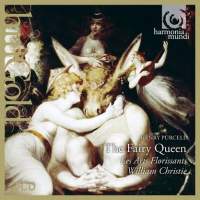Texte paru dans: / Appeared in: |
|
|
Outil de traduction |
|
|
|
|
|
Reviewer: Michael
Ullman Abridger version: ... Supported by various agencies in the French Government, Les Arts Florissants staged The Fairy Queen in Aix-en-Provence last July. (New Yorker readers may remember Andrew Porter's review.) This recording was based on that performance. Perhaps that is why it is, at least marginally, more theatrical than the dignified, carefully shaded Gardiner. (Christie has a larger cast of singers than does Gardiner as well—Gardiner allows more doubling of roles.) It is in fact dangerous to generalize about these two performances, but it is noteworthy that, at least in the vocal music, Gardiner goes for somewhat faster tempos and more clipped phrasing than the Christie. In the purely instrumental music, often Christie is speedier, and more exuberant. The Christie “Dance for the Green Men“ of act III is pleasingly wild: he has recorders piping brightly over the orchestra. Gardiner gives a more terraced, and subdued, performance. Throughout, Gardiner's strings are a little more nasal, though not unpleasantly so. Christie gets a warmer sound. He seems to have a more romantic sensibility. We hear the differences in the masque of act II, where Night comes on singing “See, even Night herself is here.“ Christie's orchestra has, compared to Gardiner's, a big, rounded sound, and Christie brings out the secondary lines behind the violins more boldly, creating a background with more fluidity as well as sensuousness. On the other hand, some might prefer the rounded tones of Gardiner's soprano, Jennifer Smith, to the brassy Nancy Argenta. In the number that follows, Mystery (Judith Nelson in Gardiner, Sandrine Piau in Christie) sings “I Come to Lock All Fast.“ Piau tries to create mystery in her approach; Nelson is perkier, and cheerful-sounding. One might say that Christie is more aware of the drama, but then consider Sleep's song, “Hush, no more, be silent.“ On the new Harmonia Mundi recording, Jerome Correas uses his bass voice broadly, and when the chorus comes in, we hear a beautiful depth of sound. Gardiner has his bass, Stephen Varcoe, virtually whisper, and his chorus is delicate, ethereal, as if it's stealing away on tiptoe while anxious not to wake the fairy queen. That is, of course, what the play tells us it is doing. I am not sure how seriously one should take the drama of The Fairy Queen. The piece is receiving “authentic“ performances, which might mystify Purcell, who in writing his opera was adulterating a known masterpiece, Shakespeare's A Midsummer Night's Dream. Purcell revised Shakespeare to make a gorgeous spectacle that appealed to all the senses. When his production was revived in 1693, a year after its opening, Purcell added the first-act music, which completes the oblique insult to Shakespeare by including a drunken poet scene. And Purcell wrote two new songs, including “The Plaint“ which intrudes on the triumphant last act, which celebrates marriage and invokes Hymen, with a traditional-sounding complaint about a lost lover. I am glad that song appears on both these recordings: in a live performance, however, I would cut it. Listen to either one of these recordings straight through, and you will be totally satisfied. Compare them, and you will be struck by the warmer, deeper sound of the Christie, and by Gardiner's more subtle approach. Some may prefer the sensuousness of the Christie; others may be bothered by the vagaries of pronunciation by some of his French singers. (A minor problem, in my opinion.) Gardiner's Fairy Queen is a recognized triumph. This new recording is its equal.
| |
|
|
|
|
|
|
|
Cliquez l'un ou l'autre
bouton pour découvrir bien d'autres critiques de CD |
|




